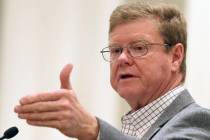Mining oversight panel, scholarship aid bills OK’d
CARSON CITY -- Good students, rejoice.
Gov. Brian Sandoval on Thursday signed into law a bill that appropriates an extra $10 million to make the Millennium Scholarship program solvent at least until 2015.
The program, which provides up to $10,000 in scholarships for good Nevada high school graduates to attend state colleges and universities, had faced possible insolvency because of the decline of money used to pay for the scholarships.
The scholarship funding bill, Senate Bill 486, was one of 30 bills signed by the governor. Others include legislation to create the Mining Oversight and Accountability Commission, one that will allow private advertising in Department of Motor Vehicles offices and one to create the Silver State Insurance Exchange.
One of the unique bills signed by Sandoval was Senate Bill 149. Sponsored by Sen. Barbara Cegavske, R-Las Vegas, it calls on the state to treat "persons with intellectual disabilities with consideration and respect."
Instead of referring to them as people of mental retardation, the law specifies they are "persons with intellectual disabilities."
But the possible insolvency of the Gov. Kenny Guinn Millennium Scholarship program has been a special concern of state legislators, parents and children since 2009 when the Legislature reduced some of its funding because of budget shortfalls.
About 60,000 students have received the scholarship since the program's inception in 2000. Now 21,000 students enrolled in state colleges and universities are receiving the grants.
The program provides about $25 million in scholarships a year to students with 3.25 and higher grade-point averages. The funds cover about 56 percent of their tuition costs.
Funds come from a $7.6 million annual appropriation in state unclaimed property funds, with 40 percent of the money Nevada receives each year from a settlement with the tobacco industry over smoking-related illnesses. But those funds have been declining with the drop in smoking.
Other bills signed by Sandoval included the following:
■ Senate Bill 493 creates the seven-member state Mining Oversight and Accountability Commission to oversee the mining industry. The bill grew out of testimony that the industry had been granted unapproved tax deductions by the Tax Commission that reduced its tax bills to the state. Under the new law, the commission must review and determine whether mining deductions are permitted by law. Five of the commission members will be appointed from legislative recommendations.
■ Senate Bill 440 creates the Silver State Insurance Exchange to establish programs to help small employers provide health insurance to their employees. The exchanges were required under the federal Patient Protection and Affordable Care Act.
■ Senate Bill 483 allows the Department of Motor Vehicles to enter into contracts to allow private companies to advertise in its buildings.
■ Senate Bill 282, sponsored by Sen. Don Gustavson, R-Sparks, makes it a crime, punishable by six months in jail and a $1,000 fine, to intentionally post in public the Social Security number of another person.
■ Senate Bill 309, sponsored by Sen. James Settelmeyer, R-Minden, authorizes people who provide care for livestock owned by others to remove the animals from their property if the owners are not paying agreed-upon costs.
Settelmeyer said that because of the recession, horse owners are releasing their horses, which then become "wild horses," or not paying boarding costs. The bill allows the boarding facility owner to sell the livestock, give it to an animal organization or return it to the owner's address.
Contact Capital Bureau Chief Ed Vogel at evogel @reviewjournal.com or 775-687-3901.

















